Dog Skin Conditions: Superficial Bacterial Folliculitis
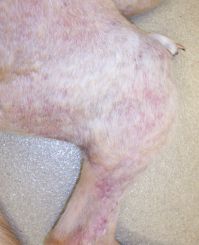
Photo courtesy David A. Senter, DVM
Cause: Most commonly, Staphylococcus (“staph”) bacteria, usually secondary to other skin disorders such as allergies, demodicosis (mange), endocrine problems, trauma, foreign bodies, and many others.
Symptoms: Shorthaired dogs often have patchy hair loss, tufts of hair raised above the coat surface and/or reddish or brown “staining” of white hairs. Longhaired dogs may have more subtle symptoms, including scaly skin, dull coat, and excessive shedding. Regardless of coat type, clipping may be necessary to fully reveal the extent of the disorder. The underlying skin lesions include bumps, pimples, crusts, or scales occurring singly, in clusters, or over large areas; reddened circular hairless areas with or without darker pigmentation in the center; scaly or crusty skin may surround the individual lesions in a circular pattern (epidermal collarettes). The degree of itchiness varies from intense to non-existent.
Treatment: Oral antibiotics for three to four weeks or longer, depending on the response; antibacterial shampoos; antibacterial ointments or sprays. Because superficial bacterial folliculitis occurs secondary to other disorders, identification and concurrent treatment of the underlying cause are essential for successful resolution.
Disclaimer: DogChannel.com’s Dog Skin Conditions are intended for educational purposes only. They are not meant to replace the expertise and experience of a professional veterinarian. Do not use the information presented here to make decisions about your dog’s ailment. If you notice changes in your dog’s health or behavior, please take your pet to the nearest veterinarian or an emergency pet clinic as soon as possible.
Deviled Doggie Eggs
Deviled eggs are a classic party snack for any occasion, but are always popular for football because of their resemblance to a football shape and of course are always a hit at Easter. With a few small adjustments, deviled eggs can quickly become doggie delights. Filled with protein, they make a healthy and grain-free treat for you and your furry friend. As with any treat, you will want to feed in moderation, especially if it’s your first time feeding a particular snack.
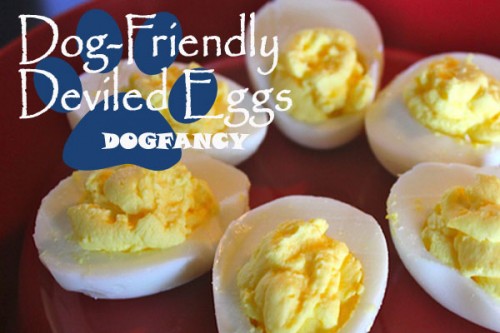
Eggs – as many as you like!
Plain, Unsweetened Yogurt – 1 Tbsp for every 2 eggs
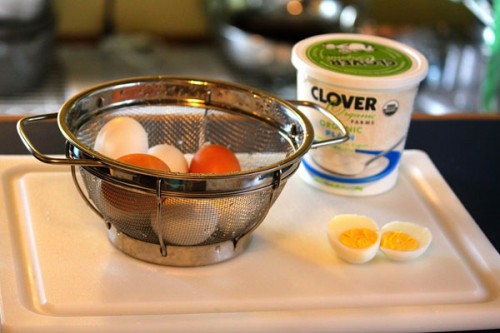
Hard boil your eggs. You can use any method you like, but this one worked for us
Put eggs in a pot and cover them with an inch of water.
Put a cover on the pot and bring the water to a boil.
Once boiling, remove the pot and let sit 15 minutes.
Run eggs under cold water and place in refrigerator to cool.
Once eggs are cooled peel and slice in half the long way.
Remove all of the yolks and place them in a bowl
Add yogurt (approximately 1 Tbsp for every 2 eggs) and mix until you get a creamy consistency.
Scoop mixture into the eggs, or if you want to be fancy, scoop mixture into a plastic bag. Cut the tip off of the bag and squeeze egg mixture back into the egg whites.
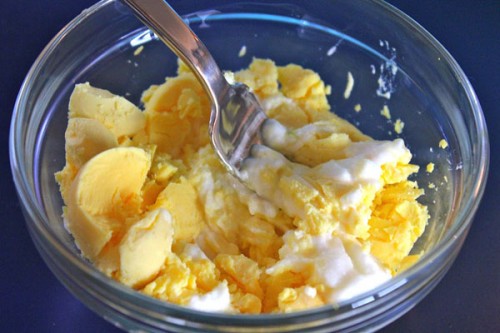
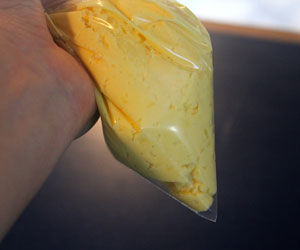

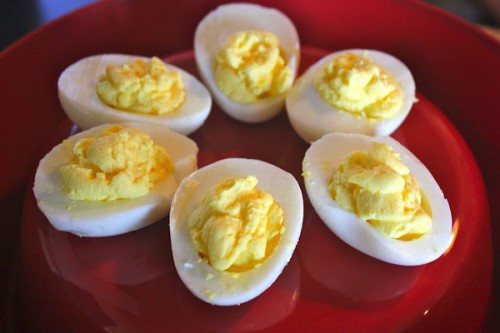
Types of Little Dog Breeds
Easygoing Small Dogs
Dogs large and small run the gamut in terms of temperament, although some are more mellow and easy going than others. Small canines who are known for having easygoing dispositions include Japanese chins, Shih Tzus, pugs, Chihuahuas and French bulldogs. If hyper dogs who are constantly on the go aren’t exactly your cup of tea, you might want to look into a pet from one of these breeds.
Lively Small Dogs
While some dogs are mellow and tranquil in nature, others are bundles of vitality and vigor. Small dogs who tend to have exuberant and bouncy natures include miniature pinschers, Cairn terriers and Yorkshire terriers. If spirited play sessions at the park and in your backyard are more your speed than cozy evenings in front of the television, then these small breeds might be most suited for you. In general, terriers are usually pretty tireless canines.
Small Dogs Who Love Other Dogs
Some dogs are eager to share in the company of their fellow canines, while others are more like loners — or they strongly prefer to be around human beings than other dogs. Certain small dog breeds are known to be more social in temperament than others. These breeds include Norfolk terriers, Cavalier King Charles spaniels and Havanese pooches. If you’re interested in a friendly small dog who doesn’t get too territorial or possessive around other animals, you just might find the canine of your dreams in one of these furry guys.
Fast Learning Small Dogs
Although properly and thoroughly training a dog isn’t always the easiest job, it has to be done. Some canines make the process a breeze, though. Small doggie breeds that are known for being training dreams include miniature poodles, papillons and Brussels griffons. Dog training typically involves everything from showing the furry cuties how to fetch to housebreaking them as puppies. Small dogs from these breeds often make those jobs easy, but remember, all dogs are individuals and some might be easier to train than others within these breeds.
Benefits of Little Dogs
When considering what kind of dog to add to your home, become familiar with all the ins and outs of the specific breed. Several advantages exist with dogs from smaller breeds. Tinier dogs tend to lead longer lives. They often can manage in smaller living environments better than larger dogs. Transporting them from one place to another also is often a simpler task, whether your destination is the groomer or the vet.





